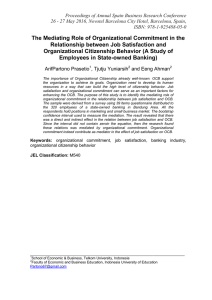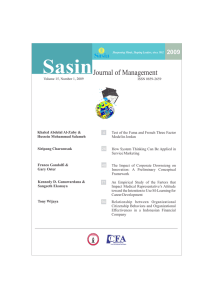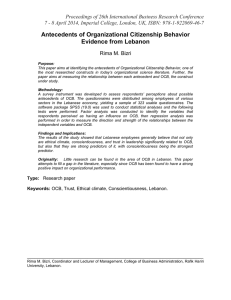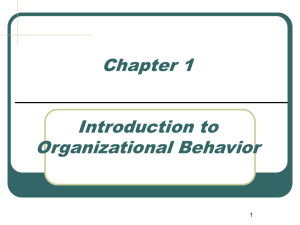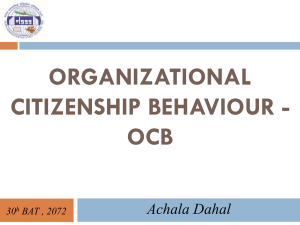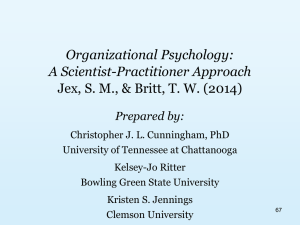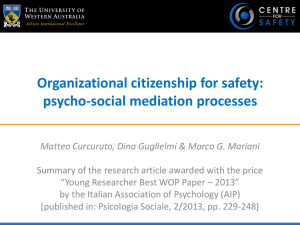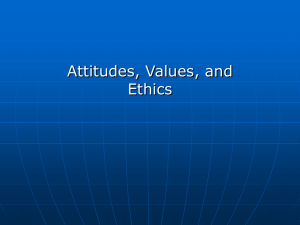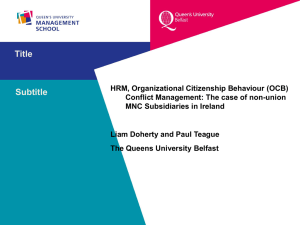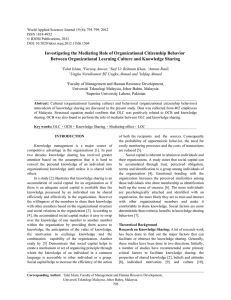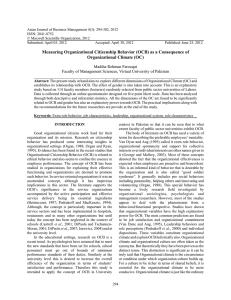satisfaction Job Relationship the
advertisement
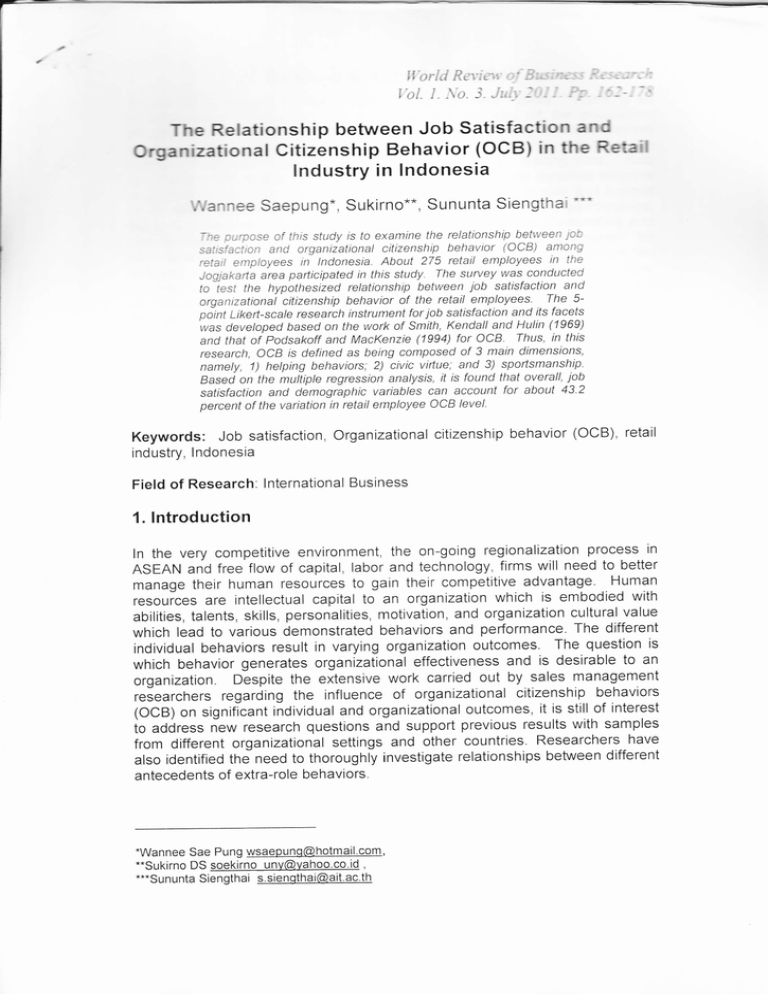
The Relationship between Job satisfaction and
Organizational Citizenship Behavior (OCB) in the Rettalill
lndustry in lndonesia
\"'i'annee Saepung*, Sukirno**, Sununta Siengtha
-',. 3-l:se of tltis study is to examine the relatronshrp betweefi ;ci
sa:rsiaiifon ancl organizationat citizenship behavior (ocB) amonE
retail employees in Indonesia. About 275 retail employees in the
Jogjakarta area participated in this study The survey was conducted
to test the hypothesized relationship between iob satisfaction and
organizational citizenship behavior of the retail employees The 5point LikerI-scale research instrument for job satisfaction and its facets
was developed based on the work of smith, Kendall and Hulin (1969)
and that of Podsakoff and MacKenzie (1994) for ocB. Thus, in this
research, ocB rs defined as being composed of 3 main dimensions,
namely,l)helpingbehaviors'2)civicvirtue;and3)sportsmanship.
Based on the muttiple regresslon analysis, it is found that overall, iob
satisfaction and demographic variables can account for about 43.2
percent of the variation in retail employee OCB level.
Keywords: Job satisfaction, Organizational citizenship behavior (OCB),
retail
industry, lndonesia
Field of Research: lnternational Business
1. lntroduction
ln the very competitive environment, the on-going regionalization process tn
ASEAN and free flow of capital, labor and technology, firms will need to better
manage their human resources to gain their competitive advantage. Human
resouices are intellectual capital to an organization which is embodied with
abilities, talents, skills, personalities, motivation, and organization cultural value
which lead to various demonstrated behaviors and performance. The different
individual behaviors result in varying organization outcomes. The question is
which behavior generates organizational effectiveness and is desirable to an
organization. Despite the extensive work carried out by sales management
reiearchers regarding the influence of organizational citizenship behaviors
(OCB) on signifrcant individual and organizational outcomes, it is still of interest
to address new research questions and support previous results with samples
from different organizational settings and other countries. Researchers have
also identified the need to thoroughly investigate relationships between different
antecedents of extra-role behaviors.
*Wannee Sae Pung wsaepunq@hotmail.com,
**Sukirno DS soekirno unv@vahoo.co.id ,
***Sununta Siengthai s.sienqthai@ait.ac.th
Saepung. Sukirno & Siengthat
-:: :
': i : I"
! rr *--*r::
--; --:e^'].3a 3i :'3CCSS S :Zl' -? ' a:=
'":
-3
:: : " ; " "
-: - ::
'=S:.' == ::-:':
=-:3SS S3:Te^: a-l 3^a-3
lu*'-r-a,-. s 3''re sectoithat has gooo pt-spLct'c- 3r: ^"-.' z-: i*: : -i*'"
r;:-€-3::- - :r't 3 economy. Yet. to ensure the sus:a -;c : -::':-'--= :'* llr'{
- ^^^^^i^
nr:
-.]=Pg Ui much on the elfectiveness of the pa.t 3 pa:
- -:. _r
r,:,zi'?, 1978) SUggest three drfferent bastc behavtors that;=-=': =::::-l il
=':
:':z^ zattcn According to them. employees should ('i1 n'': ': ='::-:::--:'*
,-3tn zatton SystemS, (2) should demonstrate dependable rc e r:*:'*:
a:: eving established work standards; and (3) should exhibtt i-:.=: ,. 2-:'
Spontan;ouS behavior: performance beyond role requLiere-:: ':accomplishments of organtzational functions" (Kalz and Kahn. 1978 T-e as:
category comprises actions such as cooperative actions with other mer:''be's
actions that promote a favorable climate at workplace, actions that imprc'e
organizational system and so on. The focus of this paper's investigation is on
tha last category of behaviors which reflect what we call 'organizational
citizenship behavior'. We aim to investigate the relationship between job
satisfaction and its facets and organizational citizenship behavior (OCB). ln the
following sections, we first describe and discuss the concepts of organizational
citizenship behavior (OCB) and job satisfaction. Then, the research
methodology will be described. Following this, findings will be presented and
discussed. Finally, conclusion and managerial implications will be provided.
2. Employee Job Satisfaction and OCB
ln this section, we review relevant literature to provide an understanding
on
what we mean by organizational citizenship behavior and its importance in the
retail industry and what factors are found to influence OCB in the previous
studies. Although many studies have found several factors that influence the
level of OCB of employees, this study focuses on the influence of job
satisfaction and its different facets on the level of OCB among employees in the
retail industry in lndonesia.
2.1 What is Organizational Citizenship Behavior (OCB)?
The manifestation of OCB arising from job satisfaction can be theoretically
traced back to the social exchange theory of Blau (1964). Blau describes social
exchange as an open-ended stream of resource transactions which involve in
develop-ing and maintaining personnel relationships which are based on trust
(Rousseau etal., 1998). When people experience the positive mood state, they
iend to associate with pro-social behavior which is about behaving in such "a
good citizenship"; therefore "an organization with a highly satisfied work force
benefits from the goodwill in the community that satisfied worker help foster"
(Organ, 1988, p 121)
The meaning and definitions of organizational citizenship behavior have varied
Katz and Kahn (1978) divided behaviors in organizations into in-role behavior in
accordance with formal role descriptions, and extra-role behavior beyond formal
role requirements. According to this view, extra-role behavior arises from
feelings of "citizenship" with respect to the organization. Organ (1988' p4)
defined OCB as "an individual behavior that is discretionary, not directly or
r63

